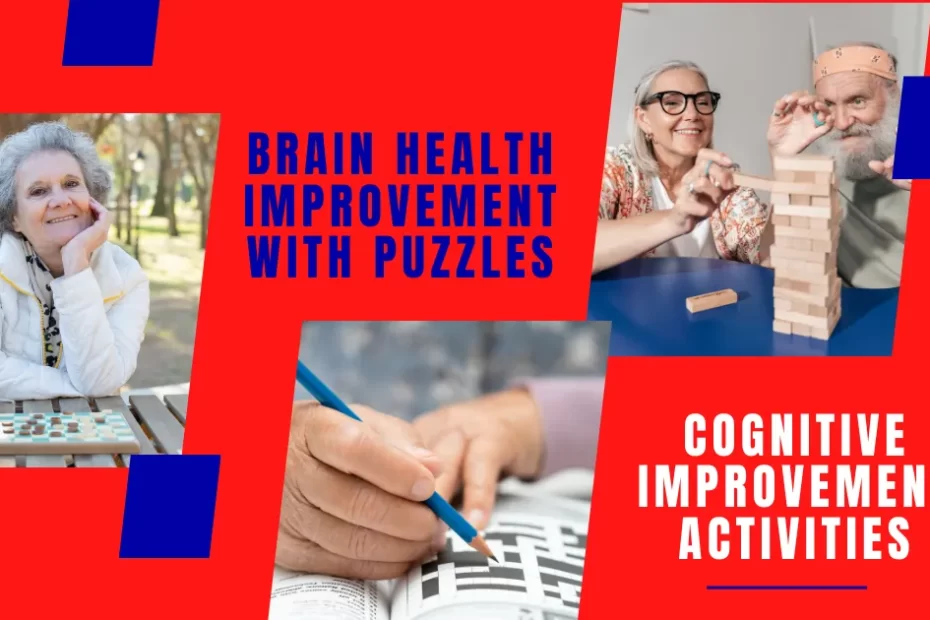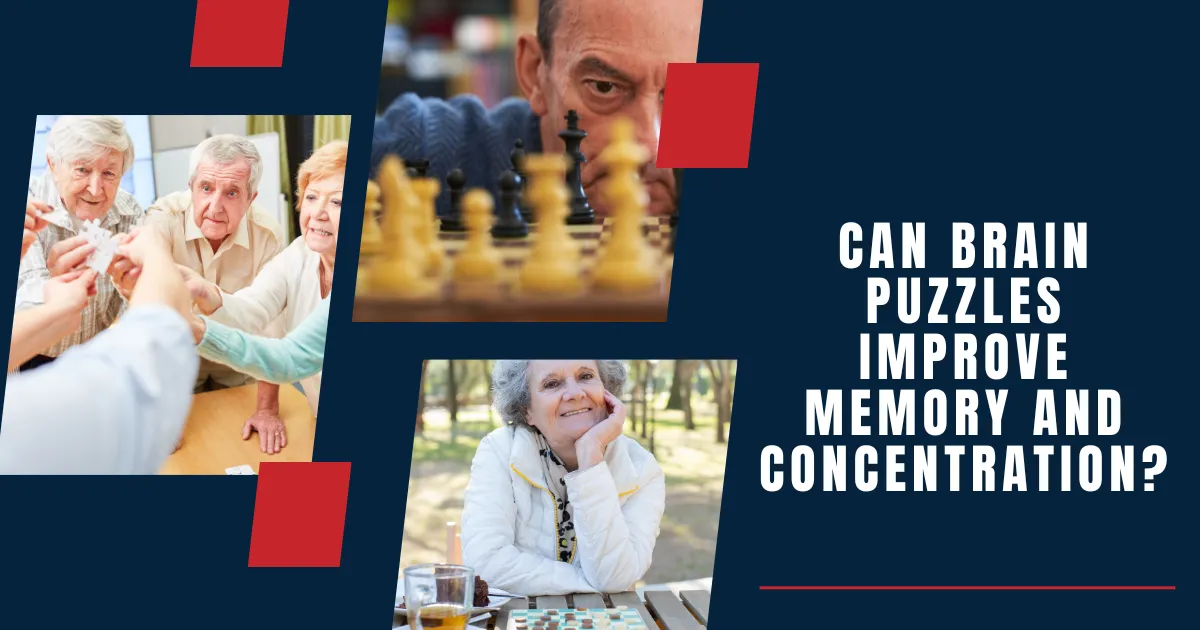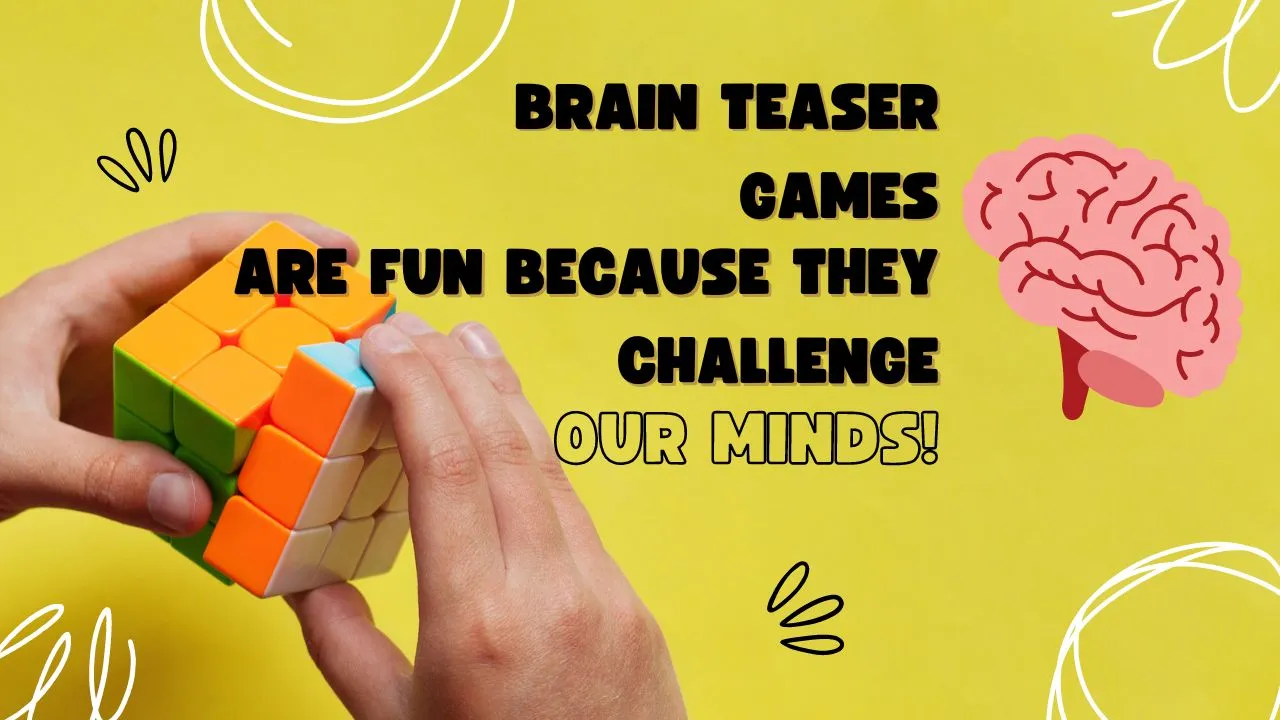In the world of rapid technological advancement and increasing life expectancy, mental health and cognitive maintenance have taken center stage. Mind games, brain teasers, and puzzles have emerged as powerful tools in bolstering brain health. They’re not just a source of entertainment but a means to keep our brains active, agile, and healthy.
- Brain Teasers, Mind Games & Puzzles: Keeping Your Brain Healthy
- Source & Credits:
Brain Teasers, Mind Games & Puzzles: Keeping Your Brain Healthy
Improving Cognitive Function Through Puzzle-solving Activities
Puzzles For Enhancing Memory And Mental Agility
Mind Games, brain teasers stimulate various parts of the brain and can enhance cognitive functions such as memory, problem-solving, and attention to detail. They provide a mental workout, improving neural connections and even fostering the development of new neurons, a process known as neurogenesis.
Consider crossword puzzles, a favorite pastime for many. Mary, a retired teacher, spends an hour each day immersed in these word challenges. It’s not just a hobby but a conscious effort to stimulate her brain and keep her vocabulary expansive and memory sharp.
Similarly, logic puzzles such as Sudoku have made their mark in cognitive enhancement. John, an engineer, attributes his acute problem-solving skills not just to his profession but also to his affinity for Sudoku. The numeric puzzles have been his companion during commutes, honing his logical thinking and concentration.
Furthermore, the advent of digital platforms has brought a plethora of online brain teasers. Apps and websites offer personalized puzzles tailored to an individual’s cognitive strengths and weaknesses, facilitating targeted mental exercise and tracking progress over time.
Psychological Well-being
Engaging in brain teasers and puzzles isn’t only about boosting cognitive functions. These activities contribute significantly to psychological well-being. They offer a sense of accomplishment, reduce stress, and enhance mood, fostering an overall positive mental state.
Sarah, a corporate executive, has found solace in jigsaw puzzles. Amidst the hustle and bustle of her busy life, dedicating time to piece together intricate images is therapeutic. It’s a journey of creating order out of chaos, culminating in a sense of achievement and visual delight.
Moreover, brain teasers can be a communal activity. Families and friends often engage in board games that involve strategic thinking and problem-solving. Alex recalls fond memories of weekend gatherings centered around chess, an embodiment of cognitive stimulation that is also deeply intertwined with social bonding.
In the educational domain, teachers often incorporate puzzles into their teaching. For instance, mathematical riddles and science conundrums make learning interactive and fun, promoting critical thinking while mitigating classroom anxiety and fostering a positive learning atmosphere.
Physical Health Correlation
There’s a profound connection between physical health and brain health. Brain teasers and puzzles, while exercising the mind, are often more effective when complemented by physical activity. The combination fosters overall wellness.
Ella, an avid runner, has experienced this firsthand. Post her runs, engaging in quick brain teasers has become a ritual. The enhanced oxygen supply to the brain post-exercise makes cognitive exercises more productive, augmenting her mental agility.
Conversely, brain exercises contribute to physical wellness. Harry, battling a chronic illness, found that immersing himself in chess not only kept his cognitive functions robust but also alleviated his physical discomfort. It’s a testament to the mind-body connection, where mental engagement can manifest in physical well-being.
Adopting a balanced diet further complements the effects of brain teasers. Nutrient-rich foods fuel both the body and mind. Olivia, a nutritionist, emphasizes the incorporation of omega-3 fatty acids and antioxidants in the diet, amplifying the cognitive benefits derived from mental exercises.
Lifelong Learning and Adaptation
The brain’s plasticity, its ability to adapt and evolve, is significantly influenced by how we exercise it. Brain teasers and puzzles foster lifelong learning, keeping the brain adaptable, resilient, and agile.
Consider the evolution of Emma, a writer. Her affinity for language puzzles has not just enriched her vocabulary but has rendered her adept at learning new languages. Each new word or phrase learned is a testament to the brain’s adaptive learning process.
Technology has played a pivotal role in this domain. Virtual reality (VR) brain games are emerging, immersing players in environments that are not just visually captivating but also cognitively stimulating. Jake, a tech enthusiast, attests to the enhanced cognitive engagement offered by VR puzzles, marking a new frontier in brain health.
Books and traditional puzzles continue to hold their ground amidst technological advancement. The tactile engagement of flipping pages or assembling puzzle pieces has its cognitive merits. For Lily, a librarian, the blend of old and new forms of puzzles epitomizes the adaptability of the human brain.
Benefits Of Engaging in Puzzles & Mind Games For A Brain-Healthy
Engaging in puzzles is not just a pastime; it’s a powerful tool for maintaining brain health and cognitive function. Whether you’re solving crosswords, Sudoku, or jigsaw puzzles, these activities offer numerous benefits that contribute to a vibrant mind and overall well-being.
From improving memory and enhancing problem-solving skills to boosting mood and reducing stress, here’s a closer look at the many advantages of incorporating puzzles into your daily routine.
Here’s an explanation of how that happens:
Enhanced Cognitive Function
One of the primary benefits of engaging in puzzles is their ability to enhance cognitive function. When you tackle a puzzle or other mind games, your brain is actively working to analyze information, make connections, and solve problems. This mental stimulation helps keep your brain sharp and can even contribute to the development of new neural pathways, improving overall cognitive function.
Memory Enhancement
Regularly engaging in puzzles can also have a positive impact on memory. Whether you’re memorizing patterns in a Sudoku puzzle or recalling clues in a crossword, these activities require you to use your memory muscles. Over time, this practice can lead to improved short-term and long-term memory retention, making it easier to recall information in daily life.
Specific puzzles, such as crosswords or memory card games, directly target memory skills. For instance, remembering the layout of previously turned cards in a memory card game or recalling words in crosswords can enhance both short-term and long-term memory.
Concentration Improvement – Increased Attention to Detail
Mind games and engaging in puzzles often requires a keen eye for detail. Whether you’re searching for specific pieces in a jigsaw puzzle or analyzing clues in a word puzzle, these activities encourage you to pay close attention to the details. This heightened sense of observation can spill over into other areas of your life, improving your ability to notice nuances and make more informed decisions.
Puzzles require a degree of focus and attention to detail. Whether it’s spotting patterns in a jigsaw puzzle, concentrating on numerical arrangements in Sudoku, or tracking narrative clues in a mystery puzzle, these activities train the brain to focus for extended periods, enhancing concentration.
Stress Reduction
Puzzles offer a form of relaxation and escapism that can help reduce stress and anxiety. When you’re focused on solving a puzzle, your mind becomes fully immersed in the task at hand, temporarily diverting attention away from worries and stressors. This meditative quality can promote a sense of calm and mindfulness, providing much-needed relief from the pressures of daily life.
For example, individuals like Lisa, a professional who spends 20 minutes each day solving different kinds of puzzles, have noticed an improvement in her ability to concentrate during meetings and remember detailed information. The habit of solving puzzles has not only become a leisure activity but has also contributed to her cognitive improvement.
Mood Enhancement
Engaging in puzzles can also have a positive impact on mood and emotional well-being. The sense of accomplishment that comes from solving a challenging puzzle can boost self-esteem and confidence. Additionally, the dopamine release associated with problem-solving can create feelings of pleasure and satisfaction, lifting your spirits and improving your overall mood.
Social Connection – Adaptation and Challenge
Puzzles are often enjoyed as a social activity, providing an opportunity for bonding and connection with others. Whether you’re working on a puzzle with family members, friends, or colleagues, it’s a chance to collaborate, communicate, and share in a common goal. This social interaction can strengthen relationships and foster a sense of belonging and community.
The adaptability of puzzles to various skill levels ensures that the brain is constantly challenged. As individuals become proficient in certain types of puzzles, they can opt for more complex ones, ensuring continuous cognitive engagement and improvement.
10 Mind Games to Exercise Your Brain into Being Healthy
Just like your body, your brain needs regular exercise to stay sharp and healthy. Engaging in mentally stimulating activities, such as playing certain types of games, can help improve memory, enhance problem-solving skills, and even protect against cognitive decline. Here are 10 mind games and mental exercises to help keep your brain in top shape.
1. Jigsaw Puzzles
Why it’s good for your brain: Jigsaw puzzles work both sides of your brain. The left, logical side processes the pieces and patterns, while the right, creative side works on visualizing the complete image. This dual-hemisphere activity improves your spatial reasoning and short-term memory.
2. Sudoku
Why it’s good for your brain: Sudoku is an excellent workout for your logical and deductive reasoning skills. It forces you to think ahead and use trial and error to find the right solution, which strengthens your problem-solving abilities.
3. Chess
Why it’s good for your brain: Chess is a classic strategy game that requires deep thinking, planning, and foresight. It improves your ability to analyze consequences, enhances pattern recognition, and boosts your strategic planning skills.
4. Crossword Puzzles
Why it’s good for your brain: Crossword puzzles are a fantastic way to improve your vocabulary and verbal fluency. They also challenge your memory as you recall words and facts, strengthening your cognitive retrieval skills.
5. Playing a Musical Instrument
Why it’s good for your brain: Learning and playing a musical instrument engages multiple brain regions simultaneously. It improves hand-eye coordination, fine motor skills, and your ability to process and recall auditory information.
6. Learning a New Language
Why it’s good for your brain: Learning a new language improves your multitasking abilities and your attention span. It creates new neural pathways and enhances your cognitive flexibility, making it easier for your brain to switch between different tasks.
7. Memory Card Games
Why it’s good for your brain: Simple card games like “Concentration” or “Memory” are perfect for exercising your short-term and working memory. They force you to remember the location of cards, strengthening your ability to recall information.
8. The “What’s Different?” Game
Why it’s good for your brain: This is a simple but effective exercise. Look at a picture or a scene, then close your eyes and ask a friend to change one or two things. When you open your eyes, try to identify what’s different. This improves your observation skills and attention to detail.
9. Meditation
Why it’s good for your brain: While not a game, meditation is a powerful mental exercise. It can improve focus, reduce stress, and has been shown to increase grey matter in the brain, which is associated with cognitive health and memory.
10. Reading Fiction
Why it’s good for your brain: Reading fiction is an active exercise for the brain. It requires you to create mental images of characters, settings, and events, which boosts your imagination and creativity. It also improves empathy by allowing you to step into the perspective of another person.
Next Topic: How often should I engage in puzzles to maintain a brain-healthy lifestyle?



Great article you put together, I have always liked doing the Cryptoquote Puzzles in the newspaper. They are great for keeping the old brain cells active.
Great Site Razz, I would like to share efforts with you
Pingback: Alin
Pingback: Jorginho
Pingback: Memory Games For Brain Health: Boost Your Memory - praktikotips
Pingback: Active Aging: Burn Calories, Stay Vital in The Golden Years